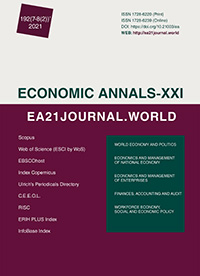Transformation of economic interests in the context of the multipolar world order formation
Transformation of economic interests in the context of the multipolar world order formation
Author(s): Anna Mikhailovna Chernysheva, Katrina Dobrova, Ekaterina Dobrova, Vera KuznetsovaSubject(s): Economy, National Economy, Supranational / Global Economy, Business Economy / Management, Geopolitics
Published by: Institute of Society Transformation
Keywords: National Economic Interests; Economic Security; Globalization; World Economy; National Interests; Bipolar World Order; Multipolar World Order;
Summary/Abstract: The national interests of countries directly depend on the world order established at a certain time, which constantly transforms, exerting key influence on international economic relations. Understanding the changes of the world order of economic systems allows to understand the transformation of the national interests of countries. All countries can be conventionally divided into attractor countries and satellite countries, which form their national economic interests in accordance with the interests of attractor countries. At the same time, satellite countries can eventually become attractors, and vice versa.The goal of the article is to study the existing world order and its transformation from unipolar to multipolar. To achieve this goal, the authors have explored a change in the concept of national economic interests depending on the influence of global changes in the economy and on the transformation of national economic interests in a particular world order; they have also analyzed the historical change in the world order and determined its current format and assessed the current export-import operations of the leading European countries.It is assumed that the national economic interests of countries have changed as a result of the transition from a unipolar world order to a multipolar world order, including the national economic interests of European countries. As such, the national economic interests of countries should be transformed with due consideration of situational combinations of attractor countries. To test this hypothesis, the authors have analyzed publicly available documents, including statistical data on export-import operations of the key European countries, Russia, China, and the USA.In general, it has been proved that a multipolar world order has formed at the present stage of international economic relations; decision-making at the international level and ensuring national economic interests depend on the situational cooperation of the attractor countries, while some satellite countries are gradually transforming into attractor countries.
Journal: Економічний часопис - ХХІ
- Issue Year: 192/2021
- Issue No: 7-8(2)
- Page Range: 15-25
- Page Count: 11
- Language: English

